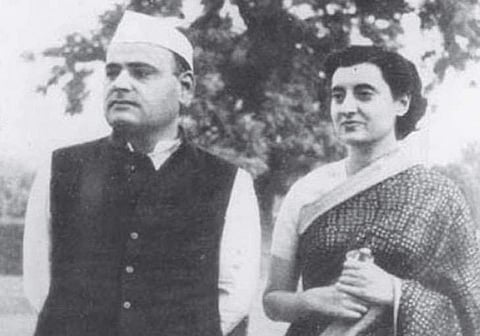

From a purely physical point of view, there would not have been Sanjay or Rajiv Gandhi, had Feroze not been there. The destiny of Indira Gandhi may have been different. She would perhaps not have been the prime minister of India. She could have become Frau Indira Oberdorf and settled in Germany… Candidly speaking, Feroze was as much a founding father of the Nehru-Gandhi dynasty as were Motilal and Jawaharlal Nehru. Not that I am sure that he would have appreciated this dynastic family streak.” Feroze Gandhi was born in 1912 and died in 1960 at a relatively young age.
As the blurb says, Feroze Gandhi was several things—Indira Gandhi’s husband, Jawaharlal Nehru’s son-in-law, Congress worker, freedom fighter and MP. Given this importance, it is odd that barring passing mentions and Tarun Kumar Mukhopadhyaya’s book (1992) on Feroze Gandhi as an MP, there is not much that is credible in substance. What I quoted is from the Introduction. To quote from the concluding chapter, “On the other hand, if Feroze had been alive when Nehru died and Feroze’s friend Lal Bahadur Shastri became the prime minister, there would have been a totally different situation. It is possible, even probable, that Shastri would have brought his old companion… and not Indira into the Cabinet… That would for sure have been a stepping stone towards the post of India’s prime minister.” This is speculative and a counter-factual. But there is no denying the need for a good Feroze Gandhi biography.
As a columnist and TV journalist, and friend of India, Bertil Falk’s name is familiar. In 32 chapters and three appendices (one of these is the Lok Sabha speech in 1957 on the life insurance scandal, a second is Feroze Gandhi’s birth certificate), Bertil Falk attempts this biography. There is a staccato and TV-script style to this book, which doesn’t always make for pleasant reading. However, in fairness, the author doesn’t describe it as an autobiography, but as “a personal narrative”. The period in Parliament and with National Herald is relatively more familiar and there is isn’t much value addition in this volume, except for putting all the information together. “When Feroze Gandhi started to hunt corrupt businessmen and capitalists and in passing, got institutions nationalised, he stumbled upon the fact that people of the administration were involved in corrupt dealings. It soon dawned on him that even the Congress party was infected by corruption, which was at its worst there because his party was the party in power. He realised that it happened right under the very nose of his father-in-law, the prime minister.”
The real value addition and Bertil Falk’s love for investigative journalism and mysteries (he has edited anthologies of mystery fiction) figure elsewhere, such as in tracking down Feroze Gandhi’s parentage. The Muslim speculation is laid to rest, but there is still uncertainty about both the father and the mother. “Thus, the problem is not solved. Only DNA would lay this controversy to rest once and for all.” There is also such probing of what Feroze Gandhi studied in LSE. (He dropped out.) The speculation about Kamala Nehru is dismissed, but that about Feroze Gandhi’s several romantic interludes accepted. We are given a lot of information about the marriage between Feroze Gandhi and Indira Gandhi and about the animosity between the former and M O Mathai. Despite what I said about the staccato style, the sense of humour is evident. “Thus, this is by no means the ultimate biography on Feroze… It is therefore my hope that other researchers, especially young students of modern Indian history will continue the quest for Feroze and fill the missing pieces in the mosaic.” That’s the reason this book is worth reading.